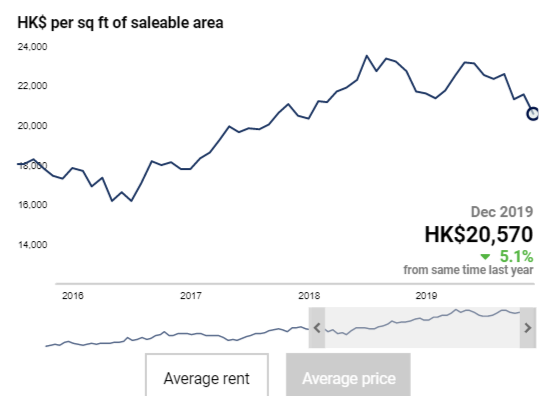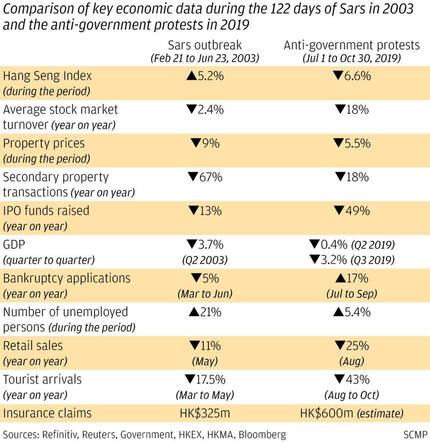For decades, Hong Kong real estate market experienced a crescendo of seamless and thriving growth becoming the most expensive market globally in terms of affordability for medium income households, as shown in several studies (ex multis, in the Annual Demographia International Housing Affordability Study). However, a combination of an uncertain political turmoil, the pressure deriving from the US-China trade war and now the current outbreak of the Covid-19 are deeply threatening the sound development of Hong Kong’s property market, besides affecting stock indices and external trade relationships.
The actual impact of this real estate slump is clearly visible just looking at market data, but the potential shock is still to come. Indeed, according to Bloomberg Intelligence, the cumulative transaction value of commercial and retail properties experienced a considerable plunge of 12.9% in early 2020 amid lower transactions’ volumes and sizes. The downward trend is also noticeable in average rents, which dropped by 4% in January and in the vacancy rate of commercial properties, which reached the 7% threshold. These figures may not appear particularly alarming, especially due to the high market volatility of the last month. However, this negative sentiment, in tandem with a precarious growth in demand has the real power to generate a severe recession in Hong Kong’s economy in the upcoming months.
Indeed, there is a general consensus that markets (including the real estate one) are going to fully reflect Covid-19 with a sort of delay, as it happened last year for the political manifestations that started in March but were completely transposed in markets later in summer. (The principium of this downward trend can be seen in the figure below)
The actual impact of this real estate slump is clearly visible just looking at market data, but the potential shock is still to come. Indeed, according to Bloomberg Intelligence, the cumulative transaction value of commercial and retail properties experienced a considerable plunge of 12.9% in early 2020 amid lower transactions’ volumes and sizes. The downward trend is also noticeable in average rents, which dropped by 4% in January and in the vacancy rate of commercial properties, which reached the 7% threshold. These figures may not appear particularly alarming, especially due to the high market volatility of the last month. However, this negative sentiment, in tandem with a precarious growth in demand has the real power to generate a severe recession in Hong Kong’s economy in the upcoming months.
Indeed, there is a general consensus that markets (including the real estate one) are going to fully reflect Covid-19 with a sort of delay, as it happened last year for the political manifestations that started in March but were completely transposed in markets later in summer. (The principium of this downward trend can be seen in the figure below)
The natural risk of this uncertain environment is the potential downward spiral in property prices. In particular, commercial banks may show a bearish attitude in granting new loans and valuating properties, therefore inducing owners, especially the less liquid ones, to sell. This would push prices down even further in negative equity region, where the market price of the property becomes lower than the outstanding debt (mortgage loan) on the same property. As a matter of fact, this is already an ongoing phenomenon that can only be amplified, just considering that in December 2019, 128 mortgage loans (the number doubled from October) with a cumulative value of 764 mln HKD (approx. 98 mln USD) were valuated less than their mortgage amount.
That’s not all. This downtrend can potentially expand from real estate market to a more generalized slowdown of Hong Kong’s economy for a plethora of variables, as it was pointed out by Keith Wu Shiu-Kee, the CEO of Sunlight Real estate Investment Fund. In particular, tourism is now severely affected as six borders connecting Mainland China and Hong Kong have been closed, reducing the tourism flow by 97%. Clearly, this reduction can translate into a drop in consumer goods demand, especially for luxury products, where the demand is mainly driven by Mainland China’s customers. Looking at the table below, which compared the effects on Hong Kong’s economy of Sars and the anti-government protests, we can read the possible influence that Covid-19 can have in worsening the already compromised current situation.
That’s not all. This downtrend can potentially expand from real estate market to a more generalized slowdown of Hong Kong’s economy for a plethora of variables, as it was pointed out by Keith Wu Shiu-Kee, the CEO of Sunlight Real estate Investment Fund. In particular, tourism is now severely affected as six borders connecting Mainland China and Hong Kong have been closed, reducing the tourism flow by 97%. Clearly, this reduction can translate into a drop in consumer goods demand, especially for luxury products, where the demand is mainly driven by Mainland China’s customers. Looking at the table below, which compared the effects on Hong Kong’s economy of Sars and the anti-government protests, we can read the possible influence that Covid-19 can have in worsening the already compromised current situation.
Even in this potentially critical environment, financial institutions are trying to inject trust in the market in order to stabilize it and to avoid fluctuations in property prices. Indeed, both HSBC and Hang Seng Bank, respectively the second and third players in Hong Kong as mortgage providers, are showing a prudent but optimistic attitude, clearly declaring that the financial assessment and properties valuation in loan applications would be performed as usual, trying to isolate as much as possible them from the effects of Covid-19 and all the other abovementioned factors . However, despite all these efforts, Hong Kong property market has proved not to be Covid-19 immune.
Vincenzo Ricci
Want to keep up with our most recent articles? Subscribe to our weekly newsletter here: http://eepurl.com/gXkWpf
(Source of cover image: Pixabay.com)
Vincenzo Ricci
Want to keep up with our most recent articles? Subscribe to our weekly newsletter here: http://eepurl.com/gXkWpf
(Source of cover image: Pixabay.com)

